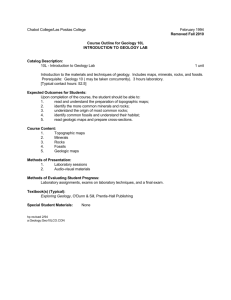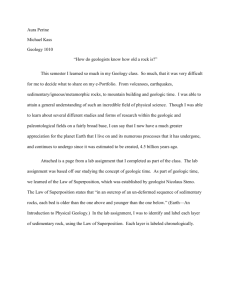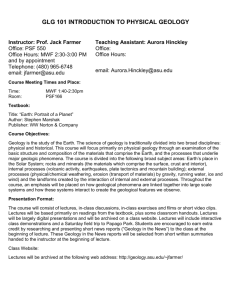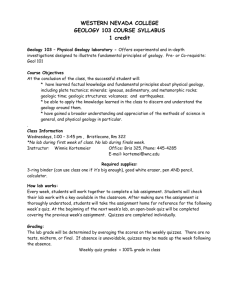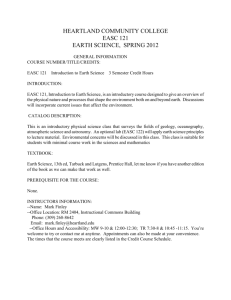Geology 161: Physical Geology
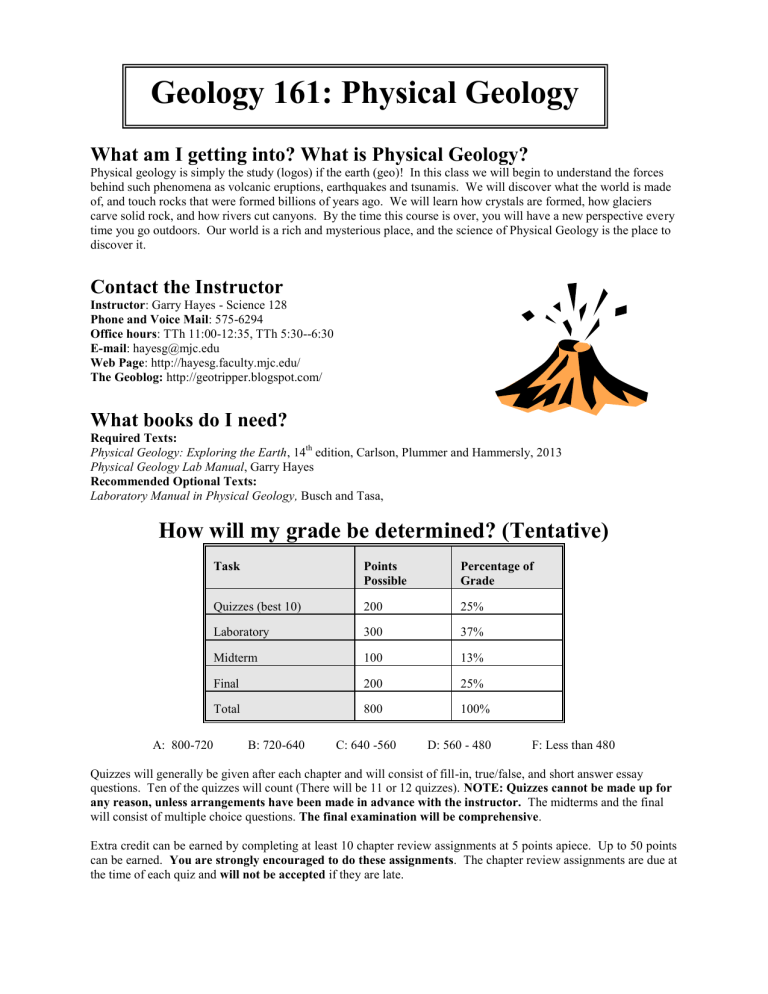
Geology 161: Physical Geology
What am I getting into? What is Physical Geology?
Physical geology is simply the study (logos) if the earth (geo)! In this class we will begin to understand the forces behind such phenomena as volcanic eruptions, earthquakes and tsunamis. We will discover what the world is made of, and touch rocks that were formed billions of years ago. We will learn how crystals are formed, how glaciers carve solid rock, and how rivers cut canyons. By the time this course is over, you will have a new perspective every time you go outdoors. Our world is a rich and mysterious place, and the science of Physical Geology is the place to discover it.
Contact the Instructor
Instructor : Garry Hayes - Science 128
Phone and Voice Mail : 575-6294
Office hours : TTh 11:00-12:35, TTh 5:30--6:30
E-mail : hayesg@mjc.edu
Web Page : http://hayesg.faculty.mjc.edu/
The Geoblog: http://geotripper.blogspot.com/
What books do I need?
Required Texts:
Physical Geology: Exploring the Earth , 14 th
edition, Carlson, Plummer and Hammersly, 2013
Physical Geology Lab Manual , Garry Hayes
Recommended Optional Texts:
Laboratory Manual in Physical Geology, Busch and Tasa,
How will my grade be determined? (Tentative)
Task
Quizzes (best 10)
Laboratory
Midterm
Final
Total
Points
Possible
200
300
100
200
800
Percentage of
Grade
25%
37%
13%
25%
100%
A: 800-720 B: 720-640 C: 640 -560 D: 560 - 480 F: Less than 480
Quizzes will generally be given after each chapter and will consist of fill-in, true/false, and short answer essay questions. Ten of the quizzes will count (There will be 11 or 12 quizzes). NOTE: Quizzes cannot be made up for any reason, unless arrangements have been made in advance with the instructor.
The midterms and the final will consist of multiple choice questions. The final examination will be comprehensive .
Extra credit can be earned by completing at least 10 chapter review assignments at 5 points apiece. Up to 50 points can be earned. You are strongly encouraged to do these assignments . The chapter review assignments are due at the time of each quiz and will not be accepted if they are late.
When does it all happen? (This schedule is very tentative)
Tentative Schedule
4
5
6
7
8
Week
1
2
3
13
14
15
9
10
11
12
16
Date
Jan. 15-17
Jan 22-24
Jan 29-31
Feb 5-7
Feb. 12-14
Feb. 19-21
Feb. 26-28
March 5-7
March 12-14
March 19-21
March 26-28
April 2-4
April 9-11
April 16-18
April 23-25
Final Examination
Topics
Introducing Geology; Origin of the Earth
Minerals
Igneous Rocks and Intrusive Activity
Volcanism
Volcanism
Weathering and Sedimentary Rocks
Metamorphic Rocks - MIDTERM #1
Geologic Structures and Earthquakes
The Interior of the Earth - Sea Floor
Plate Tectonics and Continents
Mass Wasting
Running Water
Groundwater
Glaciers
Work of Wind and Deserts, Shorelines
Tuesday, April 30 10-12:50 AM
“After sleeping through a hundred million centuries we have finally opened our eyes on a sumptuous planet, sparkling with color, bountiful with life. Within decades we must close our eyes again. Isn’t it a noble, an enlightened way of spending our brief time in the sun, to work at understanding the universe and how we have come to wake up in it? This is how I answer when
I am asked—as I am surprisingly often—why I bother to get up in the mornings.”
Richard Dawkins
Reading
Chap. 1 & 23
Chap. 2
Chap. 3
Chap. 4
Chap. 4
Chap. 5 & 6
Chap. 7
Chap. 15-16
Chap. 17 & 18
Chaps. 19 & 20
Chap. 9
Chap. 10
Chap. 11
Chap. 12
Chap. 13-14
Are you the kind of person who ignores handouts? Don’t do that:
Read all of this!
Surviving Physical Geology
ALWAYS ATTEND CLASS
- This shouldn't have to be said, but it is truer for science courses than for many others: You will miss a tremendous amount of information if you aren't there. If you have to miss a class, you are still responsible for all that occurs, including test and quiz announcements . Call me or get notes from someone else in the class. (Also, three (3) consecutive absences will be considered sufficient grounds for dropping you from the course)
READ THE TEXT BEFORE THE LECTURE
- Read the text after the lecture. And read it before tests. Do the practice quizzes at the end of the chapters. Books are required for a reason. I’ve found some of the best ones available; make use of them.
ALWAYS TAKE COMPLETE NOTES
- and rewrite them after referring to your text. You will remember only 10% of what you hear, 20% of what you write, but more than 40% of what you hear and rewrite.
Practice your drawing skills; a picture may truly be worth a thousand words.
SCORE CARD:
Quizzes:
Chapter Review:
Midterm and Final:
Every student is unique with different strengths and weaknesses.
Some of you may find this to be a difficult course, while others may find it to be relatively easy. The most important point to know is that you can pass this course ! It may, however, be necessary to change some of your study habits and learning strategies, especially if you are just beginning your college education.
There is no substitute for effort.
Do not come to my office two weeks before the end of the course asking how you can pass the class. You will know long before then that you are in trouble.
Class got you unnerved? Need ideas to survive this course?
GET THE HELP OF A
TUTOR OR LAB
ASSISTANT.
Too few students take advantage of the tutoring program here at MJC. The tutors are students who received 'A's when they took the course, and students who have received tutoring have had marked increases in their test scores.
This service is free (see me for details).
USE THE WEB PAGE
RESOURCES AND COMPUTER
TUTORIALS
available in the geology lab.
The computers provide an excellent alternative to the usual lecture and lab style of learning. It takes only minutes to learn how, even if you haven't dealt with computers before. Explore the department web page to see what resources are available there: http://hayesg.faculty.mjc.edu/Geology161.html
.
FORM A STUDY GROUP
with other members of the class.
Many times what one person does not understand can be explained by another. You can quiz and drill each other
SET ASIDE STRICT STUDY HOURS
.
Students often rebel at the concept of study time outside the classroom (at least I did while in school!) This is unfortunate, since most learning occurs during study time.
Make it a habit to give 2 hours of study for every hour of class lecture. If you are working, it may be harder to schedule study time, and yet all the more critical. Don’t neglect lunch hours for study time (I got my degree while selling shoes at a department store!).
USE 3X5 FLASH CARDS
to help memorize terms. Much difficulty in this course results from not learning the language of science. Put the term on the front, and the definition on the back.
Carry a few in your pocket or purse, and glance at them when you are standing in line, or during commercials.
MAKE USE OF THE
INSTRUCTOR'S OFFICE
HOURS
: I am available and happy to help you in any way I can. If you can't make it during regular office hours, call me and make an appointment. If you can’t call me, then e-mail me
( hayesg@mjc.edu
). If you can’t e-mail, then fax me at 575-6696.
THE PARTING SHOT
: If you successfully read all of the above, you have earned the right to some extra credit points! Get to a computer, and visit the Geology 161 website (you can access it at http://hayesg.faculty.mjc.edu/Geology161.html
)
Note the location at which the picture was taken, and e-mail me before the second class meeting to receive 5 extra points (handwritten notes don’t count).
Physical Geology Laboratory
"DOING" SCIENCE:
Contrary to the view of many people, most scientific research is not done by the lonely and slightly mad research genius working in an isolated castle. It is a communal effort of many people working together, trying to solve a common problem or puzzle.
In the lab, we will also work in groups. Your grade points will be evenly split between your individual efforts and those of your group. Each group should have 3-4 people and will be selected during the first lab period. If anyone is not doing their part in the group, they will not be given the credit for the group's work. Please see the instructor if there are any problems. If you work better on your own, you may feel free to do so.
THE PRELAB ASSIGNMENT:
The first page or two of each lab assignment should be read and completed prior to lab each week . These prelab assignments will be graded when your notebooks are collected mid-semester, and again at the end of the semester. There are some occasional surprises. Don’t forget to check the pre-lab assignments every week!
THE LAB:
The Lab meets in Room 132 of the Science Building Addition. Each week a new exercise will be assigned. Unless otherwise noted, the lab exercises will be due at the beginning of the following week. Although each individual will complete the assignment in their own lab manuals, most weeks the group will submit a single copy of the assignment with everyone's signature. Twice during the semester, the lab notebooks will be collected and graded for individual credit.
Pop quizzes will be given a number of times during the semester (groups will work together on these).
The midterm and final will be individual efforts.
LAB EXIT QUIZZES
You can leave the lab as soon as you are done with the day’s assignment. For attendance purposes, and as a source of learning outcome feedback, you are requested to take the lab exit quiz , a series of four questions or problems on the subject of the day. You are to answer the questions by yourself, without the help of books or notes. To get credit, you must get three out of the four questions correct. You may make three attempts to pass, but you must go to the end of the line each time. Take the completed lab to the instructor or laboratory assistant to receive your grade. The quizzes are worth two points each, and cannot be made up at a later time.
EQUIPMENT AND TEXT:
Physical Geology Lab Manual by Garry Hayes (Required)
Laboratory Manual in Physical Geology, Busch and Tasa, (Recommended)
10 power handlens (available at Bookstore, Great Valley Museum or NASCO West)
Colored Pencils
Assignment
Score
Exit Exam
6
7
8
Week
1
2
3
4
5
13
14
15
9
10
11
12
Date
Jan. 15-17
Jan 22-24
Jan 29-31
Feb 5-7
Feb. 12-14
Feb. 19-21
Feb. 26-28
March 5-7
March 12-14
March 19-21
March 26-28
April 2-4
April 9-11
April 16-18
April 23-25
Group Exercises
Tentative Schedule
Topics
Physical properties of minerals
Rock-forming minerals
Sedimentary, metamorphic and ore minerals
Plutonic and Volcanic rocks
TBA
Sedimentary Rocks
Metamorphic Rocks
Topographic maps and Volcanoes
( Midterm exam )
Structural geology - faults and folds
Geologic maps I
Geologic maps II
Streams and rivers
Glaciers
Del Puerto Canyon Field Trip
Coastal Landforms and Laboratory Final
Chap. 15
Chap. 15
Chap. 10
Chap. 12
Chap. 12
Chap. 14
Reading
Chap. 2
Chap. 2
Chap. 2
Chap.3-4
Chap. 6
Chap. 7
Appendix
Chap. 15
What will you know when you finish this course? What new skills will you have?
The following items are the Student Learning Outcomes (SLO’s) for Physical
Geology. Upon successful completion of the course, you will be able to:
A.
Analyze the elements of the scientific method and explain how these principles apply to the study of the earth . All sciences share a common methodology of attaining knowledge that seeks to eliminate bias and prejudice in research. You will know the difference between a hypothesis and a theory (and it may very well not be what you think!).
B.
Explain the geologic processes of tectonism, erosion, and mineral and rock formation.
You live in one of the most diverse landscapes in the world: there are few places where you can start driving in a hot desert, go up and ski for a few hours, and then go to the beach to work on your tan. Almost every important geologic process has an example taking place in this state, and you will understand how they work. Not to knock pop culture, but you will know more about geology than literally any television or newspaper reporter. You will be criticizing and critiquing the news regularly, especially when they make mistakes about earthquakes and volcanoes.
C.
Use the basic geologic principle of uniformitarianism and the examples of present-day geologic processes to explain the formation and evolution of the features of the earth.
Many people are surprised that a geologist can look at a few rocks in a roadcut or mountainside and then immediately tell a complete story of how those rocks came about. In this class, you will learn the set of principles that geologists use to tell the story of the rocks. You will have the ability to interpret the story in the rocks yourself, either in pictures and diagrams, or by visiting the localities yourself.
D.
Assess and evaluate competing hypotheses regarding the concept of geologic time, the origin of the earth and solar system, and plate tectonics.
Geologists are still arguing about geological processes. This is how science is meant to work, so we will be learning how controversies and arguments are settled in geologic research.
E.
Explain the necessary role of the geologist in the modern technological society in areas such as urban planning, the search for new energy resources, and environmental research . Can we drill offshore of California and bring back $2/gallon gas? Are politicians correct when they say global warming is not real? Do we have enough water for the population of the state? Should we be covering the agricultural soils of the Central Valley and building cities? Geologists have a lot to say about these issues, and you will understand how scientists approach these problems.
F.
Test for the physical and chemical properties of minerals, and identify the most common minerals and igneous, sedimentary and metamorphic rocks.
The nuts and bolts of geology is the ability to identify the most common rocks and minerals. You will know fully 95% of all the minerals and rocks anyone will ever ask you about!
G.
Interpret geologic features and landforms from aerial photographs and topographic maps . You will learn how to read maps and identify geological features on aerial and satellite imagery.
You will never have to feel ignorant when you are outdoors with this skill. And, it is more fun than it sounds (check out GoogleEarth sometime…).
H.
Distinguish three-dimensional rock structures and faults from geologic maps . You will be exercising your mind in this class; thinking in three dimensions is a rare and valuable skill that has many applications outside geology as well. And everyone should know their faults (literally).
